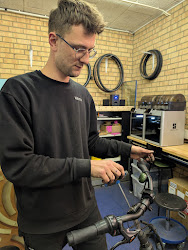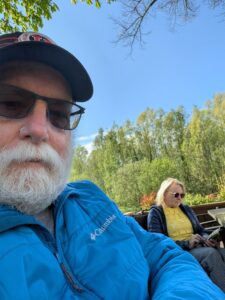 Back in the day, when I took my family on “vacation,” it was on a tight schedule. I was nervous, ready to snap at any moment.
Back in the day, when I took my family on “vacation,” it was on a tight schedule. I was nervous, ready to snap at any moment.
I often did.
While my kids’ memories of their time with me sound pleasant, mine aren’t, because I failed them. I was never living in the moment. Instead, I was living in the next moment, waiting for a disaster that was bound to happen anyway. That disaster would destroy a substantial part of our time together. It would turn my vacation dream into a nightmare.
Slow tourism isn’t about avoiding disasters. It’s about turning them into funny stories, making them go away, because one day does not matter too much, in slow tourism.
Which brings me to the other day.
Disaster
 I concocted a shopping list, assuming Dutch stores were just like American ones. They’re not.
I concocted a shopping list, assuming Dutch stores were just like American ones. They’re not.
Take bike shops, for example. Most American bike shops offer bikes, accessories, clothing, and lots of inventory. The repair staff is in the back, unseen. You deal with a salesman.
A Dutch bike shop sells bikes and repairs bikes. That’s all it does. You can find one, it seems, on every corner.
The shop is often tiny, just a few hundred square feet in size. They can sell you a bike or rent you one. There’s the smell of a welding torch, of rubber. It’s like being in the bay of an auto shop because that’s just what it is. You deal with the repairman. Many shops are in bike parking garages. Yes, they have such things.
There’s usually no inventory. There are no bike gloves, no helmets, no jackets or panniers, no headbands or knee warmers, not even branded water bottles. Just bikes, bike repair, and bike rental.
Before last week I didn’t realize that. I figured there must be many large shops that could sell me a jacket, maybe some hats that fit under a helmet and say “Netherlands” on them. Nope.
I rode from Maarssen into Utrecht, and all around the center city, 20 miles (30 km) in all, finally realizing that my old blue jacket was the perfect outfit to be wearing for the cool and drizzly weather I was riding in.
Ultimate Disaster

I came into the house I’m renting and put down my keys. I thought for a moment about what I might do. I nodded to myself, then I walked out and closed the door behind me.
Read that last paragraph again. Notice anything? That’s right, the keys were still in the house. I’d locked myself out.
I panicked. Thank God I still had my phone. I sent messages to my hosts, and I imagined the worst. My medicine was in that house. My God, I thought, I’m going to have a heart attack if I don’t have my medicine. If I had my family with me there would have been a fight.
It was getting cooler. I hadn’t heard back from anyone, so I looked for a hotel room. I found one in the back of a restaurant 15 minutes away, with a shared bathroom. I also found a 24-hour lock shop. But I couldn’t call the lock shop because I didn’t own the house. I needed the host to get back to me, like right now, but email is asynchronous, you answer when you can, and I didn’t have the host’s phone number.
I rode to the restaurant. My God, I thought, what about my phone? What about the battery on the bike? What happens when I run out of power? I don’t have any chargers with me.
Disaster Averted

The restauranteur gently guided me to a table. He said the reservation could be cancelled if my host contacted me, and he brought me a menu. There was a dish called rib tips I’d seen on other menus but hadn’t tried, and a collection of fine red wines. It was a fancy restaurant, and the customers hadn’t arrived yet.
After I began eating (those rib tips were good) I got a text from my host. He said the next-door neighbor had a key. He would contact her. I waited, in hope, then he messaged me she wasn’t home. Inside my head I panicked again, but I kept eating. (They were soft, salty, smoky, and pink inside.) Then, he texted that the neighbor’s son might be around, then that the man had a key and could drive over to let me in. Then that I had 20 minutes to get over there and the son wouldn’t wait around.
I left the last rib tip, I thanked the restauranteur, I paid for my meal, and I rushed back on the e-bike, the power level on high, my hands chilled because I had left the gloves in the house as well. The trip from Maarssen village to what’s called MaarssenBroek leads over a bridge, which crosses the main canal between Utrecht and Amsterdam, and if it weren’t for the e-bike I might not have made it.
The Lesson

Yeah, there are bills to pay. I will find some charges on my next credit card bill. But I am safe, and warm, and my host’s wife came over the next day to show me where the extra key is.
Now, imagine the previous scenes if I just had a week of vacation, and if my dear wife were with me. Imagine my feelings as I failed to accomplish anything on the day. Then imagine my feelings when the door closed behind me. Imagine the fight.

That’s why most people vacation passively. We give ourselves over to a hotel, or a cruise line, or a tour operator. We become their responsibility, we do what they want us to do, and we never meet anyone the operator doesn’t want us to meet. We don’t learn about the place, we don’t get to panic, and we certainly don’t get to try the rib tips.
But there’s a price to be paid for the story I just told. The price is time. Vacations, as we have them in America, don’t offer the time to learn about a place, to have a real adventure, to color outside the lines.
Only time does that.









